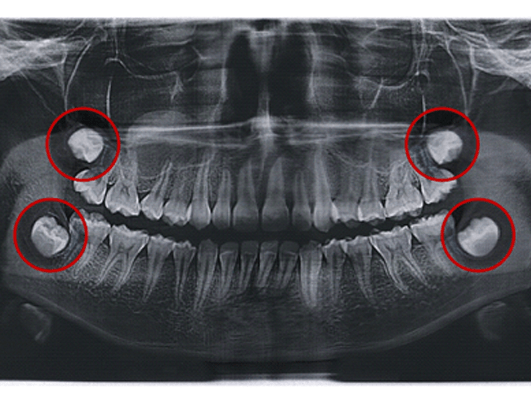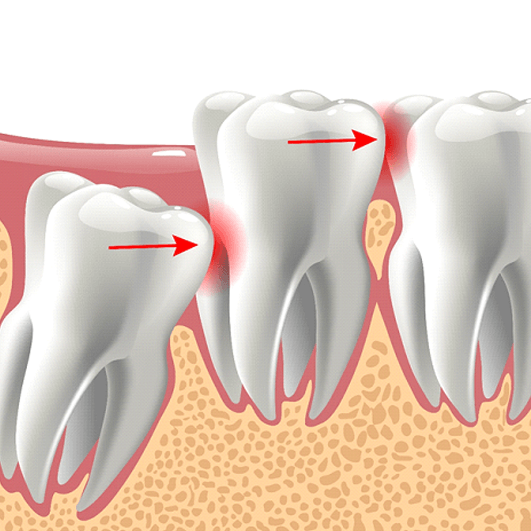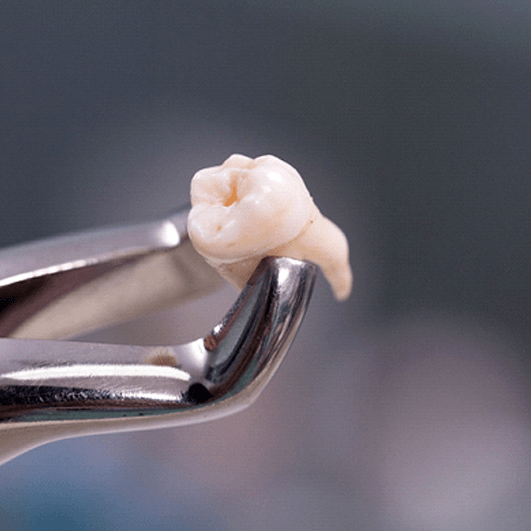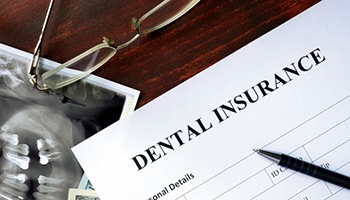Do you still have your wisdom teeth in place? These third and final molars usually start coming in around the ages of
17 and 25. This also happens to be the time when most people get them removed. After all, keeping them won’t
make you wiser. In truth, it’s typically a good idea to have them pulled as soon as possible to prevent any
potential complications from happening. If you’re experiencing any issues with your third molars or
aren’t sure if they need to be taken out, Dr.
Admasu Gizachew can take X-rays and detect any indications of problematic wisdom teeth to determine if a
removal is required. Read on or give our team a call today to
learn more about wisdom tooth extractions in Eatontown!
What Are Wisdom Teeth?

Wisdom teeth are the final set of molars to come out. Like your others, they’re wide, flat, and strong enough
to help grind and chew your meals for smoother digestion. They are typically the third molars on both your upper and
lower arches and both the left and right side of your mouth. They’re considered “wisdom” teeth
only because they come in later in life or once you’ve matured enough.
That said, humans no longer need their wisdom teeth. Due to softer diets, which require less grinding than in the
past, our jaws have become smaller than those of our ancestors. Other than not needing them for eating our food,
many people don’t even have sufficient room to accommodate their wisdom teeth. In fact, we’ve evolved
enough to where some people aren’t born with most or all of their final molars!
Why Do Wisdom Teeth Need to Be Removed?

In some cases, wisdom teeth won’t cause any issues in the mouth, so they can be left in without any worries. In
most, however, they can generally increase the risk of negatively affecting your health, comfort, and overall
quality of life if they aren’t pulled. Without sufficient space in the jaw, wisdom teeth can become impacted,
or halfway through erupting. On top of causing discomfort, this can create room for debris and harmful bacteria to
accumulate, significantly raising the risk of infection. These molars can also come in at an angle and push your
nearby teeth, damaging them and forming a misaligned bite.
What to Expect from the Wisdom Teeth Procedure

Your treatment process will depend on how your wisdom tooth is coming in. If it’s erupting at an optimal angle,
then our team can likely pull it in-office. However, if your molar is impacted, we’ll refer you to an outside
specialist to have them safely extract it. In either case, your mouth will be completely numbed with a local
anesthetic to keep you comfortable and pain-free. You may likely be sedated so that you’re relaxed throughout
the appointment. Your teeth will then either be separated from your gums with a device called an
“elevator” or your tooth will be divided into pieces to be removed one piece at a time.
Recovering from Wisdom Teeth Extraction

You’ll need to have a friend or family member drive you to and from your appointment on the day of your
procedure. We’ll provide you with specific aftercare instructions before and after your treatment. These may
include using a cold compress and taking prescribed pain relievers before your numbing medication wears off. While
facial swelling, soreness, and light bleeding are common symptoms, they’re typically short-lived and easily
managed. Be sure to get plenty of rest, as it can take several days to a couple of weeks to recover from your
procedure.
Understanding the Cost of Wisdom Tooth Extractions

Have you scheduled a wisdom tooth extraction for a later date? Although you might require the treatment to protect the rest of your smile, it’s still natural to wonder how much the procedure will cost. Various factors can affect the overall price, so you won’t be able to get an estimate without an initial consultation. Once you arrive, our team will walk you through what to expect from the process as well as how much you might pay for the treatment. Until then, here’s what you should know about the cost of wisdom tooth extractions.
Learn More
Factors That Can Impact the Cost of Wisdom Tooth Extractions

The overall price of the procedure will be affected by a variety of components that our team will need to consider, which we will discuss with you during your first visit. These factors can include:
- Number of teeth needing extraction: In many cases, we’ll recommend removing all four wisdom teeth in one sitting. However, not every patient has all four, and some choose to extract only one or two in a single visit, which can alter the price of the treatment.
- Amount and type of sedation: We can provide you with sedation dentistry to further reduce discomfort during your procedure while also increasing relaxation. Depending on the amount and the type of sedative provided, the cost can vary.
- Performing oral surgeon: For regular wisdom teeth that are positioned at a proper angle, we can typically remove them in the office. If the molars are impacted, however, we’ll refer you to a trusted specialist, which can impact the price.
Does Dental Insurance Cover Wisdom Tooth Extractions?

Not every dental insurance company will provide coverage for oral surgeries, but many of them offer at least a partial amount for wisdom teeth extractions. This will depend on several factors, like meeting your deductible or reaching your annual maximum. If you wish to know more about the details of your plan, be sure to consult your provider ahead of time so that you know how to make the most of your benefits. You can also speak with our team, as we’ll be more than happy to walk you through your policy and file insurance claims.
How to Make Wisdom Tooth Extractions Affordable

Those who don’t currently have insurance shouldn’t feel like they’re automatically going to be left behind. Our team understands the importance of having good oral health and doesn’t want you to hesitate to get the care you need. That’s why we offer alternative payment plans, such as our in-house membership plan and CareCredit. The former allows you to access discounts for most dental services by paying one, low annual fee, and there are different tiers to choose from based on your budget. The latter is a third-party financier that can help break up the overall price of your treatment into small, little-to-no-interest, monthly installments. This way you can spend more time improving and maintaining your smile instead of worrying about the cost!
Wisdom Tooth Extractions FAQs
How Do You Make Wisdom Teeth Pain Go Away?
The only permanent cure for pained wisdom teeth is tooth extraction from a dentist. Still, there are ways to relieve the discomfort temporarily.
One approach is to use a cold compress. For this method, wrap a towel around an ice pack and apply it to the outside of your cheek for brief periods. Doing so would reduce swelling and produce a numbing effect.
You could also take medication. For example, over-the-counter pain relievers can stave off wisdom tooth pain for a while.
Lastly, there’s always the option of rinsing with saltwater. The latter mixture can soothe agitated tissues, clear out trapped food debris, and minimize bacterial buildup.
How Should I Prepare for My Wisdom Tooth Extraction?
If you have any questions before treatment, please bring them up with your dentist. They’ll happily guide you on how to prepare for surgery. In fact, they’ll likely give you the following tips:
- Prepare a Travel Method – Have someone drive you to and from the office, as you won’t be fit to drive after receiving sedation or anesthesia.
- Avoid Late-Night Snacking – Don’t eat or drink after midnight on the night before treatment.
- Dress Appropriately – If you’re getting IV sedation, wear a shirt that has short sleeves or ones that easily roll up. Similarly, wear glasses instead of contacts; you must keep your eyes closed during the procedure.
How Long Does Wisdom Tooth Surgery Take?
On average, extracting a single wisdom tooth takes 15-20 minutes. Removing all four can thus involve a 90-minute surgery.
Still, the exact timing will depend on your situation. In particular, it might rise or fall based on the tooth’s location, position, or whether it’s impacted. Talk to your dentist, then, to get an estimate of the treatment timeline.
Whatever the situation, though, chances are you’ll think the treatment is short. The dentist will sedate you before treatment, so you won’t feel much time pass.
How Soon Can I Eat After Wisdom Teeth Removal?
At a minimum, wait an hour or two after the removal to eat. You’ll need to secure your gauze pads during the first sixty-ish minutes, as they’ll slow down post-procedure bleeding.
Even if you feel hungry, sticking with the waiting period is crucial. Otherwise, chewing with a still-numb mouth could lead you to bite your tongue, lip, or cheek. You could also upset the treatment site and delay your recovery.
Once you’ve waited a couple of hours, you can eat a restricted diet. In particular, stick to foods like soup on the first day. You can move on to soft foods starting the day after. At the four-or-five-day mark, adding heartier foods as you feel comfortable will be fine.
What’s the Best Age to Get Wisdom Teeth Removed?
Technically, there isn’t a set age by which a person must have their wisdom teeth removed. Both young and older adults can get the procedure done when needed. That said, you should note a few things about the extraction process.
Firstly, dentists often suggest extracting wisdom teeth in early adulthood. The removal work (and the recovery from it) is easier when a patient is younger. After all, the roots of wisdom teeth grow longer with time and embed themselves in the jaw. That process can make extraction tricky in older patients, leading to longer treatment and a prolonged recovery.
Scheduling an extraction is also easier for younger adults. High school or college patients can often plan their surgery around a long weekend or holiday break. Those circumstances aren’t as available for older adults with full-time jobs.
Is Wisdom Tooth Removal Painful?
Rest assured, wisdom tooth removal isn’t a painful process. Qualified dentists take steps to ensure treatment doesn’t hurt and goes smoothly for you.
You see, our dentists will always numb you before surgery with a local anesthetic. That means the area around your wisdom tooth won’t sense pain from your care. At most, you’ll only feel a slight pressure as our team rocks it back and forth in its socket. We can even add sedation to this numbing work so you’ll feel extra calm during the treatment.
You may feel sore after the surgery, but this is a temporary symptom. It should fade within a week if you follow good aftercare guidelines.
What Can I Eat After Wisdom Tooth Surgery?
You should follow a good diet after surgery, as doing so allows for a quick and seamless recovery. So, remember to follow these tips over the next few weeks:
- Avoid Hot Foods & Drinks – Your mouth will feel numb following treatment, so don’t eat hot or spicy foods and drinks. You could accidentally burn your mouth otherwise.
- Don’t Have Crunchy Stuff – You could easily bite your cheek, tongue, or lip right after surgery, so avoid crunchy foods like hard pretzels and potato chips.
- Avoid Drinking Straws – A straw’s sucking motion can disturb the blood clot over the extraction site.
- Stick to Soft Foods – For three to seven days, follow a soft food diet as your mouth heals.
How Do You Sleep After Wisdom Teeth Removal?
Sleeping after a wisdom tooth extraction can be hard, so follow your dentist’s suggestions. They may include the following:
- Take Prescribed Pain Relievers – Feel free to take prescribed or over-the-counter pain relievers. Just make sure you don’t take more than what’s recommended.
- Keep Your Head Elevated – For the first 24 hours after surgery, elevate your head above your heart. You may need to sleep on more pillows than you normally would.
- Get Supervision – If you have gauze pads in your mouth (to curb bleeding), have someone nearby while you sleep to reduce the risk of choking. They should wake you every 20 minutes to check the gauze.


 (732) 863-3899
(732) 863-3899






